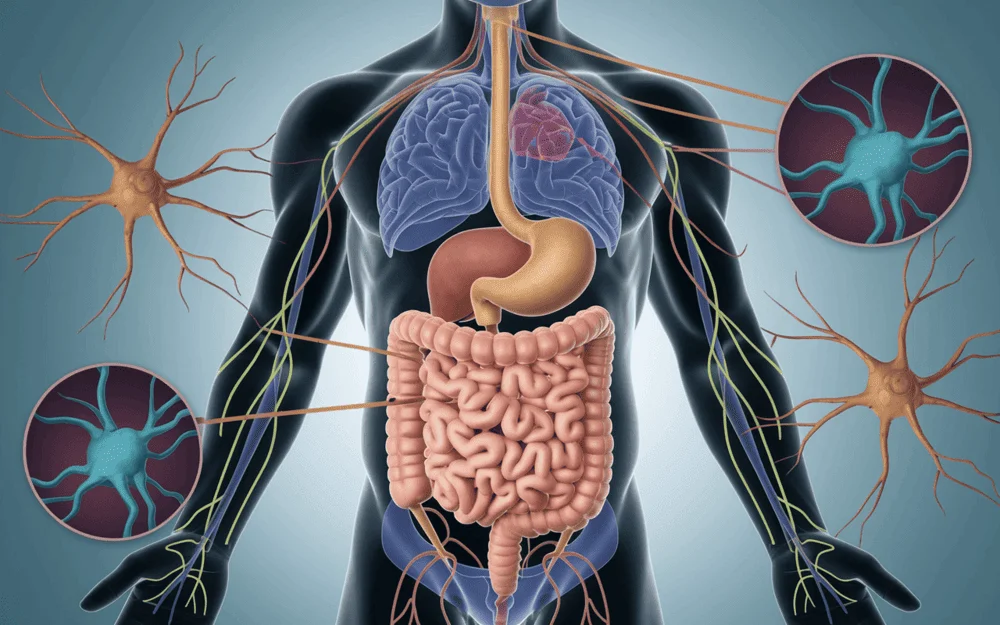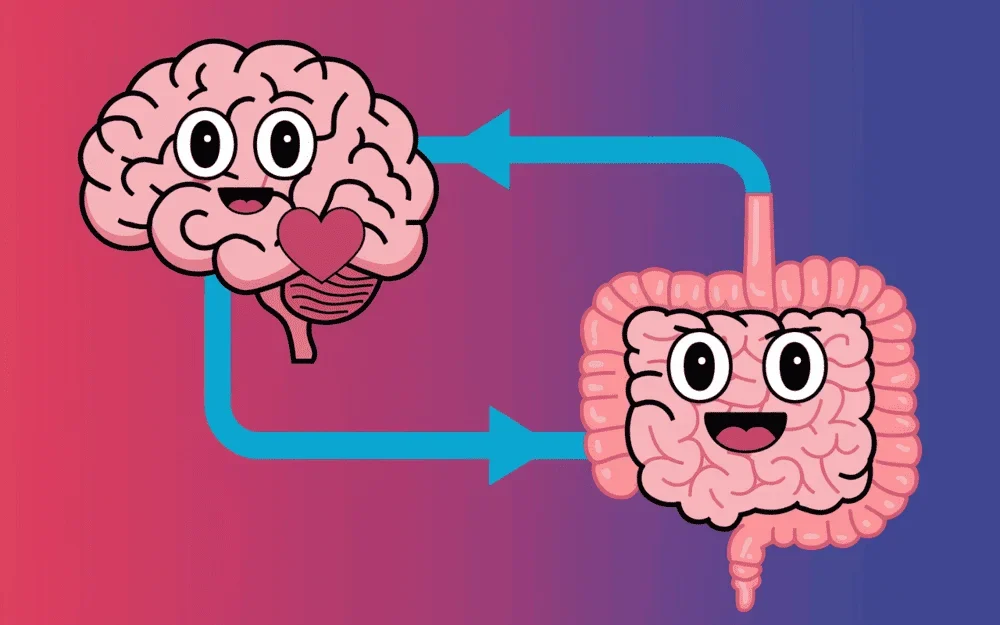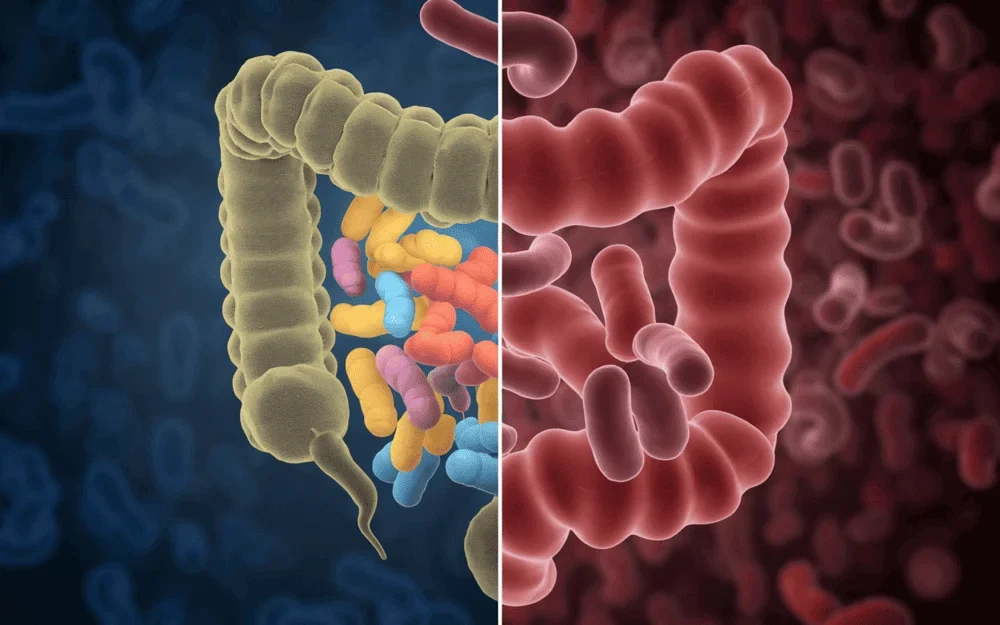In today’s fast-paced world, we often overlook one of the most crucial aspects of our health: our gut. In fact, that “gut feeling” you sometimes experience is actually a reflection of the complex ecosystem within your digestive system. So, It is important to know the 10 signs of an unhealthy gut, so we can change them as soon as possible.
Your gut health affects everything from your mood to your immune system, so recognizing the signs of an unhealthy gut is crucial for your overall well-being.
Recent studies have shown that the gut microbiome, home to trillions of microorganisms, plays a vital role in our health.
Also, as Dr. Justin Field, a leading gastroenterologist, points out, “The gut is often called our ‘second brain’ for good reason. It’s intricately connected to our overall health, influencing everything from our immune response to our mental state.”
This guide will show you the 10 most common signs that might indicate your gut needs attention. Next, we’ll provide expert insights, and offer practical solutions to help you restore your digestive health.
What Is a Healthy Gut and Its Impact
First, let’s understand what we mean by “gut health” and why it’s so important for our overall well-being.

The Gut Microbiome: Your Internal Ecosystem
The gut is home to a complex community of microorganisms known as the gut microbiome. This ecosystem consists of trillions of bacteria, viruses, and fungi that have several important roles:
- Digesting food and absorbing nutrients
- Supporting immune system function
- Producing essential vitamins and hormones
- Maintaining mental health and emotional well-being
- Protecting against harmful bacteria
As Dr. Rachel Schiesser, a renowned nutritionist, explains, “A healthy gut microbiome is diverse and balanced. Still, when this balance is disrupted, leads to a range of health issues, from digestive problems to mental health concerns.’
The Gut-Brain Connection

Our gut and brain are closely connected. In fact, this system, the gut-brain axis, helps explain why gut health can affect our mental state and the other way around.
Research has shown that the gut microbiome makes neurotransmitters like serotonin, which helps control mood and sleep. About 95% of the body’s serotonin is actually made in the gut.
This discovery has led scientists to look more closely at how gut health might affect mental health issues like anxiety and depression.
10 Warning Signs of an Unhealthy Gut
Now that we know why gut health matters so much, let’s look at the 10 most common signs that your gut might need help.

1 - Digestive Discomfort
The first and most obvious sign of an unhealthy gut is ongoing digestive problems. You might notice:
- Bloating after meals – This happens when gas builds up in your digestive tract, often due to an imbalance in gut bacteria.
- Too much gas – Excessive gas production can result from the fermentation of undigested food by gut bacteria.
- Regular stomach cramping – It may indicate inflammation or irritation in the gut lining.
- Feeling too full- Known as early satiety, this can be a sign of slow digestion or gut motility issues.
Dr. Harpreet Pall points out, “While some digestive discomfort is normal now and then, regular symptoms might mean your gut microbiome is out of balance.”
So if you notice these symptoms often, it’s important to watch what you eat and how you eat it. Also, keeping track of what you eat in a food diary can help you spot what might be causing problems.
2 - Chronic Fatigue
If you’re always tired, it might be more than just poor sleep. Your gut can make you feel tired in several ways:
- Not absorbing nutrients properly – This can lead to deficiencies that cause fatigue.
- Affecting how your body uses energy– An imbalanced gut microbiome can disrupt energy metabolism.
- Disrupting your sleep – Gut issues can interfere with the production of sleep-regulating hormones.
- Causing ongoing tiredness – Chronic inflammation in the gut can lead to persistent fatigue.
Consequently, persistent fatigue may signal that your gut health needs attention and could benefit from dietary or lifestyle changes.
3 - Sleep Disorders
Your gut makes most of your body’s serotonin, which affects both mood and sleep. So, you should watch for these signs:
- Trouble falling asleep – This could be due to an imbalance in gut-produced neurotransmitters.
- Waking up often at night– Gut discomfort or hormonal imbalances can disrupt sleep cycles.
- Irregular sleep patterns – An unhealthy gut can interfere with your body’s natural circadian rhythm.
- Feeling sleepy during the day – Poor sleep quality due to gut issues can lead to daytime drowsiness.
These disturbances may indicate an imbalance in gut health that’s affecting your sleep-wake cycle.
4 - Skin Problems
Your skin and gut health are closely connected. In fact, you might notice:
- Sudden acne breakouts – Gut inflammation can trigger skin inflammation and acne.
- Eczema getting worse – An imbalanced gut microbiome can exacerbate skin conditions like eczema.
- Skin rashes – These can be a sign of food sensitivities or gut-related immune responses.
- Dry or red skin – Poor nutrient absorption in the gut can affect skin health and hydration.
- Itching for no clear reason – This could be related to gut-induced inflammation or histamine intolerance.
These skin issues can reflect primary gut problems and may improve with better gut health.
5 - Mood Changes
One of the 10 signs of an unhealthy gut is about mood changes. Because of the strong gut-brain connection, an unhealthy gut can show up as:
- More anxiety than usual – Gut bacteria produce neurotransmitters that affect mood and anxiety levels.
- Up and down moods – An imbalanced gut microbiome can lead to mood swings.
- Feeling down – Serotonin, largely produced in the gut, plays a crucial role in mood regulation.
- Hard time focusing – Gut health can affect cognitive function and concentration.
- Getting irritated easily – Inflammation in the gut can contribute to irritability and mood changes.
As a result, these mood fluctuations may be linked to gut health issues and could improve with proper gut care.
6 - Weight Changes
Even when you’re not changing what you eat or how you exercise, you might see:
- Sudden weight gain – This could be due to gut bacteria affecting metabolism and fat storage.
- Weight loss you can’t explain – Poor nutrient absorption or gut inflammation can lead to unexplained weight loss.
- Hard time losing weight – An imbalanced gut microbiome can make weight loss more challenging.
- Weight that goes up and down – Fluctuating weight can indicate gut health issues affecting metabolism.
These changes can show that your gut is not working correctly and may need attention.
7 - Food Intolerances
If your gut isn’t healthy, you might start having trouble with foods:
- Hard time digesting certain things – This could be due to a lack of specific digestive enzymes or gut bacteria.
- Bloating after meals – Certain foods may cause excessive gas production in an unhealthy gut.
- New reactions to foods you used to be fine with – This might indicate increased gut permeability or “leaky gut.”
- Problems with dairy or gluten – These common intolerances often develop due to gut health issues.
These intolerances can be a sign of imbalance in gut health that may require dietary adjustments or professional guidance.
8 - Immune System Problems
When your gut isn’t working right, your immune system can suffer too. You might notice:
- Getting sick more often – A large part of your immune system resides in the gut, so gut issues can weaken immunity.
- Cuts and scrapes taking longer to heal – Poor gut health can slow down the body’s healing processes.
- New autoimmune issues – An imbalanced gut microbiome can trigger or exacerbate autoimmune conditions.
- Allergies getting worse – Gut health plays a role in regulating allergic responses.These symptoms may indicate that your gut health is impacting your immunity, highlighting the need for gut-supportive measures.
9 - Sugar Cravings
If you’re always craving sweets, it could mean:
- Your gut bacteria are out of balance – Some bacteria grow well on sugar, leading to cravings.
- Your blood sugar isn’t steady – Gut health affects blood sugar regulation, which can trigger cravings.
- You’re missing some nutrients – Nutrient deficiencies due to poor gut health can manifest as cravings.
- Your hormones are off – Gut health influences hormone production, which can affect cravings.
These cravings can be a sign of underlying gut issues that may improve with dietary changes and gut-supportive strategies.
10 - Bathroom Changes
- How often you go – Changes in frequency can indicate gut motility issues.
- What it looks like – Stool consistency can reflect gut health and digestion efficiency.
- Different colors – Unusual colors may signal digestive issues or nutrient absorption problems.
- Unusual smells – Strong or unusual odors can indicate changes in gut bacteria or digestive processes.These changes can indicate that your gut health needs to be addressed, possibly through dietary adjustments or professional advice.
By recognizing these signs early and taking appropriate action, you can work towards improving your gut health and overall well-being. Remember, a healthy gut is the foundation for a healthy body and mind.
What You Can Do to Help Your Gut
Now that you know the warning signs of an unhealthy gut, here’s what you can do:
First, Change Your Diet
- Eat more fiber (25-30 grams each day)
- Try fermented foods
- Cut back on processed foods
- Drink plenty of waterNext, Change Your Lifestyle
- Exercise regularly
- Learn to handle stress better
- Get good sleep
- Pay attention while eating
Also, Consider Supplements. But first, check with your doctor about:
- Probiotics
- Prebiotics
- Digestive enzymes
- Important nutrients
When to See a Doctor
f you’re feeling any of these 10 signs of an unhealthy gut, you need to see a doctor. You should also get help if you have:
- Problems that last more than 2 weeks
- Bad stomach pain
- Blood in your stool
- Weight loss you can’t explain
- Ongoing diarrhea or constipation
Conclusion
Your gut health matters a lot for feeling good overall. So, if you notice any of these 10 signs of an unhealthy gut, it’s time to make some changes. Start small – maybe add more fiber to your meals or try some yogurt. Your body will thank you for it!
FAQ
Q: How long does it take to fix gut health?
A: It usually takes 2-12 weeks if you make the right changes.
Q: Can stress hurt your gut?
A: Yes, stress can definitely affect how your gut works.
Q: Do you need to take probiotics?
A: They can help, but you might not always need them.
References
1 – Ducharme, J. (2023, March 22). What a gastroenterologist wants you to know about gut health. Time.
2 – Keshavarzian, A., Engen, P., Bonvegna, S., & Cilia, R. (2025). The gut microbiome in Parkinson’s disease: A culprit or a bystander? Nature Scientific Reports.
3 – Gut Microbiota for Health. (2023). Gut microbiome in 2023: Current and emerging research trends.
4 – Sánchez, B., Delgado, S., Blanco-Míguez, A., Lourenço, A., Gueimonde, M., & Margolles, A. (2024). Probiotics, gut microbiota, and their influence on host health and disease. Frontiers in Microbiology.
5 – American Medical Association. (n.d.). What doctors wish patients knew about improving gut health.







